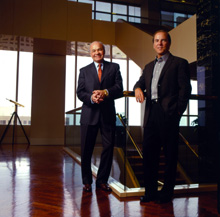Enron: The Smartest Guys in the Room
By Kim Hollis
May 2, 2005
BoxOfficeProphets.com

Based on the book The Smartest Guys in the Room, by Fortune reporters Bethany McLean and Peter Elkind, the story of Enron’s downfall is told through interviews with former employees, executives and people who had access to various meetings and conversations that took place as the business saw its rise and eventual crash. Additionally, numerous clips from Congressional hearings elaborate on the dealings that were taking place behind the scenes between guys who were known as “the smartest in the room” – Ken Lay, Jeff Skilling, Andy Fastow, Lou Pai and Cliff Baxter. For some of these men, the ultimate result would be criminal charges; for one, it would even mean death.
The movie does several things remarkably well. First off, it does a solid job of highlighting Enron’s evolution and the accounting practices that eventually led it to ruin. At the same time, the film makes quite clear that the executives at Enron are not solely to blame. It implicates the company’s accounting firm, Arthur Andersen and the company’s law firm, which was receiving almost a million dollars a day. Additionally, numerous big banks and investment firms are given the culpability that they are due. And even as the movie frequently makes its viewers laugh, it’s a short-lived humor that quickly leaves one feeling more than a little ill.
One way that the documentary manages to be extremely effective is through the use of note-perfect music. During a segment of the film that deals with the energy blackouts in California (a travesty for which the responsibility lies with Enron traders), the theme from the O.C. – Phantom Planet’s California – plays in the background. The clever usage of music and the slick filming techniques are reminiscent of much of Michael Moore’s work; however, the work here feels even more professional due to the fact that the filmmaker has (wisely) chosen not to insert himself into the proceedings. It’s certainly clear where the viewpoint is coming from, but given the subject matter, it’s really impossible for it to go any other way than against the people who profited as their employees and investors found themselves dead broke.
Probably the most memorable portion of the film again goes back to the California blackouts. As the people of that state were suffering from rolling blackouts and ridiculous energy costs, Enron traders were giggling and joking over the circumstances. If it made them money, these traders couldn’t have cared less who was injured in the process. As if the recordings of these conversations weren’t bad enough, there was then a company conference led by Skilling that showed him at the height of insensibility, comparing California to the Titanic.
And it is perhaps the clips taken directly from Enron meetings that show the major players in the worst light. From Skilling laughing hard as one employee gleefully announces they will put their 401K savings directly into Enron stock to Lay commiserating by saying that his net worth had gone from hundreds of millions to a mere $20 million (and $1 million liquidity!), the “smart” guys repeatedly show themselves to be insensitive thugs with nothing more than their own selfish interests at heart.
Enron: The Smartest Guys in the Room should be viewed as a cautionary tale. While it seems unlikely the practices that led to the company’s collapse could ever occur again in the business world, what the movie instead illustrates is that it is easy for such things to happen if there is enough complicity between the various players who are supposed to provide checks and balances. It’s an engaging but disgusting examination of corporate greed and individual temptation.